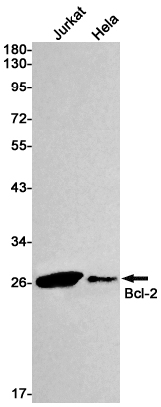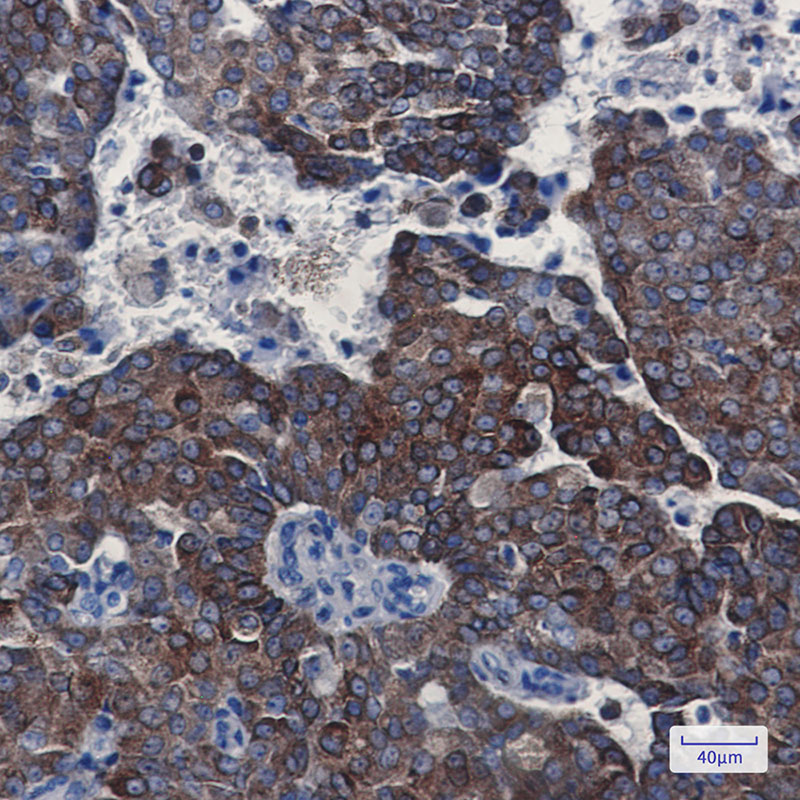

| WB | 1/500-1/1000 | Human,Mouse,Rat |
| IF | 1/20 | Human,Mouse,Rat |
| IHC | 1/50-1/100 | Human,Mouse,Rat |
| ICC | 技术咨询 | Human,Mouse,Rat |
| FCM | 咨询技术 | Human,Mouse,Rat |
| Elisa | 咨询技术 | Human,Mouse,Rat |
| Aliases | BCL2; Apoptosis regulator Bcl-2 |
| Entrez GeneID | 596 |
| WB Predicted band size | Calculated MW: 26 kDa; Observed MW: 26 kDa |
| Host/Isotype | Rabbit IgG |
| Antibody Type | Primary antibody |
| Storage | Store at 4°C short term. Aliquot and store at -20°C long term. Avoid freeze/thaw cycles. |
| Species Reactivity | Human |
| Immunogen | A synthetic peptide of human Bcl-2 |
| Formulation | Purified antibody in TBS with 0.05% sodium azide,0.05%BSA and 50% glycerol. |
+ +
以下是关于Bcl2抗体的3-4篇代表性文献的简要信息:
1. **"Cloning of the chromosome breakpoint of neoplastic B cells with the t(14;18) chromosome translocation"**
- **作者**: Tsujimoto Y., Croce C.M.
- **摘要**: 该研究首次克隆了Bcl2基因,并开发了特异性抗体用于检测其在B细胞淋巴瘤中的异常表达,揭示了染色体易位t(14;18)导致Bcl2过表达的分子机制。
2. **"Bcl-2 is an inner mitochondrial membrane protein that blocks programmed cell death"**
- **作者**: Hockenbery D., Nunez G., Milliman C. et al.
- **摘要**: 通过免疫组织化学和Western blot技术,利用Bcl2抗体证实了Bcl2蛋白定位于线粒体内膜,并阐明了其通过抑制线粒体途径细胞凋亡的作用机制。
3. **"Bcl-2 gene promotes haemopoietic cell survival and cooperates with c-myc to immortalize pre-B cells"**
- **作者**: Vaux D.L., Cory S., Adams J.M.
- **摘要**: 使用Bcl2抗体研究其在造血细胞中的表达,发现Bcl2的过表达可抑制细胞凋亡,并与c-myc协同促进B细胞永生化和淋巴瘤发生。
4. **"Prognostic significance of Bcl-2 protein expression and Bcl-2 gene rearrangement in diffuse aggressive non-Hodgkin's lymphoma"**
- **作者**: Gascoyne R.D., Adomat S.A., Krajewski S. et al.
- **摘要**: 通过免疫组化分析Bcl2蛋白在非霍奇金淋巴瘤中的表达,发现Bcl2过表达与化疗耐药性相关,提示其作为预后标志物的潜在价值。
这些文献涵盖了Bcl2抗体的基础研究、机制探索及临床应用,可作为相关领域的核心参考。
**Background of Bcl2 Antibodies**
Bcl2 (B-cell lymphoma 2) is a critical regulatory protein involved in apoptosis, first identified in chromosomal translocations linked to follicular B-cell lymphoma. As a member of the Bcl2 protein family, it localizes to the outer mitochondrial membrane and functions as an anti-apoptotic factor by inhibiting mitochondrial outer membrane permeabilization, thereby preventing cytochrome c release and caspase activation. The Bcl2 family includes both pro-apoptotic (e.g., Bax, Bak) and anti-apoptotic (e.g., Bcl2. Bcl-xL) members, which balance cell survival and death.
Bcl2 antibodies are essential tools for detecting Bcl2 expression in research and diagnostics. They are widely used in techniques like Western blotting, immunohistochemistry (IHC), and flow cytometry to study Bcl2's role in cancer, neurodegeneration, and autoimmune diseases. Overexpression of Bcl2 is associated with tumorigenesis, chemoresistance, and poor prognosis in cancers like lymphoma and leukemia. Conversely, reduced Bcl2 levels are linked to excessive apoptosis in neurodegenerative disorders.
Clinically, Bcl2 antibodies aid in cancer subtyping and evaluating therapeutic responses. For example, high Bcl2 expression in tumors may guide the use of BH3-mimetic drugs (e.g., Venetoclax), which target Bcl2 to restore apoptosis. Research continues to explore Bcl2's interactions with other apoptotic regulators and its potential as a biomarker or therapeutic target. Bcl2 antibodies thus remain pivotal in understanding cellular survival mechanisms and advancing precision medicine.
×